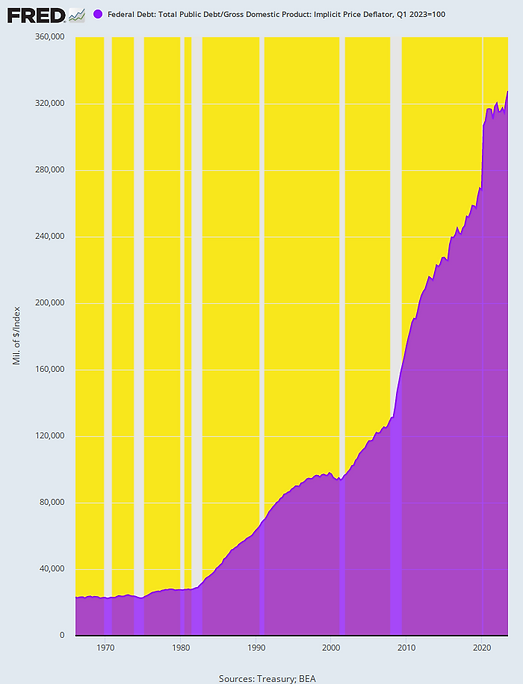The following is a translation of an article written by Ferenc Vukics, lieutenant colonel and founder of the National Defence University Foundation, originally published on Szilajcsikó.hu.
Could it be that the method used to defeat the Soviet Union is the same method that will ultimately cause the defeat of the USA?
Cherchez la femme! — that is, ‘look for the woman’, as the French saying goes, which says that it is always the ladies (or some kind of trigger or cause) who are to be sought in the background of events. In the same way, when examining the actions of a geopolitical power, we must look for the triggers. For those who do not understand the actions of hegemonic, imperial America, perhaps this chart showing the change in the US national debt in the current (2023) value of the dollar between 1966 and 2023 should tell a lot:

It is popularly believed that back then it was in the West’s interest to drive the Soviet Union into an arms race that would cause its economic collapse (and now, a similar idea about Russia persists). The chart shows that something changed in America then too (after 1980) that may take its toll now, decades later.
In today’s purchasing power,
the previously modest US public debt has increased 14-fold, from $2.7 trillion in 1980 to nearly $33 trillion today.
This increase represented a dramatically higher growth rate of 6.0 per cent per year. If the national debt had remained on the 1.4 per cent growth path between 1966 and 1980, it would be $5 trillion today, not $33 trillion, and the annual interest payment expenditure on the federal debt at a standardized 4 per cent interest rate would be $200 billion, not $1.3 trillion.
One of the most important lessons of the earlier Cold War was that the security of a country is not only determined by the military dimension in the traditional sense, but economic, cultural, political, and ecological factors are also of paramount importance.
The collapse of the Soviet Union highlighted the role of a multidimensional understanding of security:
everyone has understood that the security of a country cannot be independent of the structural conditions of the international system.
Around 1980, there was simply no sign that US politicians wanted to accumulate some kind of runaway public debt. Unfortunately, the next 43 years proved the opposite, as the flat part of the chart has become virtually vertical.
The Cold War was tried to be explained at the time by members of the realist/neorealist school and by scholars following a liberal/neoliberal conception of international relations theory, but it was an alternative theory of explanation that seemed to be more credible to me. The psychologically oriented, misconstrued approach is that the Cold War was the result of a total miscalculation, in that both sides made mistakes in assessing the intentions and capabilities of the other side, and that, in fact, it was a simple ‘human error’.
Older generations may remember that the surprise at the time of the fall of the Soviet Union was not that the Soviet system did in fact collapse, but how it collapsed. We all feel that the hegemonic world power is over now, but we will probably be surprised to hear the ‘how’ part here too. A ‘new Cold War’ could also cause the collapse of the US, a series of events that will be a major factor in the process to which the earlier Cold War victory is also linked.
The increase in debt after the 1981 turning point is of huge significance. Something epoch-making happened that saddled the US economy with an extra $28 trillion in debt, which, according to David Stockman (who was President Ronald Reagan’s Director of the Office of Management and Budget),
eventually ‘squeezed even the sunlight out of the federal budget’
and which will have another 100 million retired Americans groaning under entitlements expenses in a decade or two.
According to Stockman, the Republicans of old were people committed to fiscal rectitude, money management, free market freedom, domestic prosperity, and peaceful foreign trade. Now they have been replaced primarily by global empire and the hegemonic enterprise of the Washington neocons. As he put it,
‘All of these detours combined to compromise, confuse, and ultimately render the GOP impotent when it came to its core mission in the struggle for American politics, which is to be the watchdog of the Treasury and a staunch defender of the nation’s taxpayers and producers.’
A week ago, the Colorado Supreme Court declared Trump ineligible to run for president and disqualified him from the state’s 2024 presidential election. The main arbiter in this head-on clash of democratic principles and the rule of law will be the federal Supreme Court. Some Republicans are desperately turning to Nikki Haley as an alternative to Donald Trump’s return. What is important to know is that, except for Lindsay Graham, who to me is crazy and bloodthirsty, Nikki Haley is the most interventionist, pro-war Republican on the American political battlefield today.
As incredible as it may seem, the world would be a more dangerous place without Trump than with him.
It may very well be that in a few decades’ time, it will become clear to all analysts that the US’s rise to being a hegemonic power has carried the seeds of its downfall, too.
Click here to read the original article.
Related articles:








